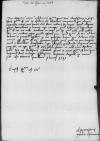List #2080
Johann TYMMERMANN do Ioannes DANTISCUSFrauenburg (Frombork), 1539-02-27
| odebrano [1539]-03-02 Rękopiśmienne podstawy źródłowe:
| ||||
Tekst + aparat krytyczny + komentarzZwykły tekstTekst + komentarzTekst + aparat krytyczny
Reverendissimo in Christo Patri et Domino, domino
Post obsequiorum meorum exhibitionem.
Reverendissime Domine, domine clementissime et gratiose.
cf.
Non mediocri profecto gaudio affectus sum, quod Reverendissima Dominatio Vestra ad benevolentiam et paternum affectum in me propensum animum suum declarare di{n}gnata sit. Ago Reverendissimae Dominationi Vestrae quam maxime possum, gratias, quod me tam benigno amore et benevolentia complectitur. Ego vicissim, quemadmodum flagranti animo semper feci, me erga Reverendissimam Dominationem Vestram sedule geram, ut nihil a me desiderari poterit.
His me devotissime commendo gratiae et amori Reverendissimae Dominationis Vestrae. Quam misericors Deus in longum quam felicissime conservare dignetur, ex animo precor.
Ex
Eiusdem Reverendissimae Dominationi Vestrae obsequentissimus


 BCz, 1597, p. 518
BCz, 1597, p. 518